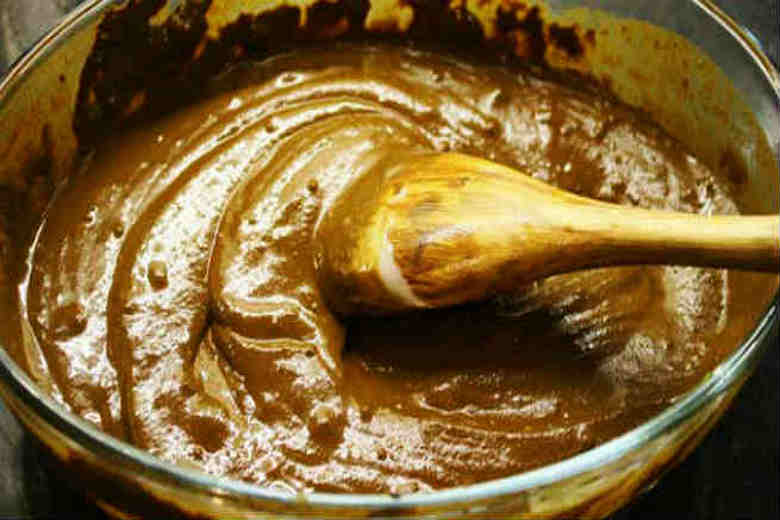Who says using henna on hair covers greys and gives the locks a youthful makeover? Instead, the magical herb can do a lot more for your mane. Henna adds a beautiful reddish-brown tint to the hair, making it frizz-free, lively, and easy to manage. Though many hair care products in the market promise to repair dry and damaged hair efficiently, henna is a much safer and cheaper alternative to those. This article will give you a kick-ass recipe for using henna for damaged and curly hair. Know how to quickly turn your unmanageable hair into smooth, sleek, and glossy locks.
What Is Henna?
Henna, scientifically known as Lawsonia Inermis, is a middle-sized flowering shrub with elliptical and lanceolate leaves and small white, pinkish, or red flowers (1). It is native to North Africa and the Middle East, where the climate remains hot and dry. Thanks to its natural and highly effective coloring pigment, henna is known to be one of the oldest dyes in the world. Henna leaves are harvested, dried, and ground into a fine powder, which yields a 100% natural color when mixed with water and turned into a smooth paste. It does not contain harmful chemicals like commercial chemical dyes; hence, it is safe for hair, skin, nails, and clothing use. Henna tattooing is an age-old and well-practiced method of dying the skin temporarily. Henna flowers with a strong, sweet smell are also used for making essential oils and perfumes.
Historically, henna was popular for its medicinal properties like reducing inflammation, easing pain, preventing spasms, and even decreasing the growth of tumors. The leaves of the plant were used to treat headache, amoebic dysentery, stomach ulcer, intestinal ulcer, enlarged spleen, jaundice, insomnia, and several skin conditions.
Why Is Henna Good For Hair?
In manufacturing, henna is used in a wide range of cosmetics, especially hair care products. But what makes henna such an excellent hair-friendly ingredient? Let us find out the truth. (2)
1. Controls Sebum
Henna helps regulate the secretion of the sebaceous glands on the scalp. This keeps the production of Sebum under control, thereby avoiding greasy scalps and oily hair.
2. Prevents Infection
The natural antibacterial and antiseptic properties of henna help prevent and heal scalp infections. It also keeps several hair diseases away by treating dandruff and allergies.
Also Read – Why Should You Use Arnica Oil for Hair? With Application and Side Effects
3. Soothes Scalp
It has excellent calming and soothing effects, efficiently cooling the aggravated and itchy scalp. As a result, the overall health of the scalp is improved to a great extent.
4. Nourishes Locks
Henna makes the hair follicles stronger and nourishes the hair shafts intensely. It improves the elasticity of hair fibers, which is essential for stopping hair breakage and frequent hair fall.
5. Promotes Growth
Everything about henna significantly contributes to hair growth, from boosting scalp health to strengthening hair follicles. Moreover, it creates a natural UV filter on the scalp and locks, which prevents them from further damage.
6. Beautifies Hair
Regular use of henna adds a beautiful reddish-brown tint to the locks, making it softer, smoother, and silkier.
Young henna leaves do not produce intensive dyes. So, the henna plant needs to be at least 2-year old before harvesting the leaves for preparing dyes.
How Does Henna Fix Damaged And Frizzy Hair?
Why should you use henna for rough, damaged, and unruly hair? Well, it can reverse the damage caused by pollution, chemical treatments, heat treatments, or dehydration by taking great care of your dry and unhealthy hair. Here is how:
1. Prevents Breakage
Henna makes the hair strands stronger from the roots. It gets soaked into the hair follicles very quickly and nourishes the hair roots, reducing the chances of Breakage and making the hair more manageable.
2. Heals Hair Damage
It plays a crucial role in repairing damaged hair cuticles (the hard surface layer that works as the protective cover for every hair strand), saving the internal hair cells from harm. Hence, all hair shafts get healed efficiently.
3. Conditions Deeply
Being a natural hair conditioner, henna can induce lots of moisture in your locks and condition them to a great extent. As a result, your dry and frizzy hair becomes moisturized and incredibly soft.
4. Maintains pH Balance
It can help us maintain the pH balance of both the scalp and the hair, which is essential for keeping the scalp hydrated, reducing dandruff, and averting the formation of split ends.
How To Use Henna For Damaged And Frizzy Hair?
Henna is a natural hair treatment when mixed with plain water, imparting a lovely dark brown hue while effectively concealing unwanted grey strands. To address severely dry, damaged, and frizzy hair, enhance the benefits of henna powder by combining it with other natural, hair-friendly ingredients. Explore the henna recipe below to achieve healthy and lustrous locks:
1. Ingredients Required
- Henna powder – 5 tablespoons or depending upon the length of your hair (try to use herbal or organic henna for the best results)
- Plain yogurt – 3 tablespoons
- Lemon – 1 large
- Egg – 1 whole
- Black tea – 1 cup
- Lukewarm water – as required
2. Method Of Preparation
- Preparing the henna mix in an iron bowl would be best as it helps the herb release the maximum color. Otherwise, a glass or a plastic bowl will be correct. Pour the henna powder into it. Add yogurt and black tea to the powder and keep beating everything together until a thick paste is formed.
- Squeeze out the juice of the lemon and mix well. Then, let the entire concoction sit for 3 to 4 hours.
- Now, beat the egg nicely in a separate bowl. Add it to the previous mixture. Stir with a spoon so that it turns a bit slippery.
- Pour lukewarm water into the mixture and try to create a consistency that will make it drip off the spoon.
3. Method Of Application
- Put plastic gloves on both hands and apply the henna mix to your hair. You can also make use of a dye brush for this purpose.
- Divide your hair into small sections and apply the paste thoroughly. Reach the tips of the hair gradually, starting from the roots, and ensure that every single strand is adequately coated.
- Secure your hair into a bun on the top of your head and cover your entire head with a shower or plastic cap.
- Wash off with lukewarm water after 3 to 4 hours to find softer, smoother, and shinier hair.
Read Also – DIY- How To Make Henna Hair Oil For Hair Growth
Hair Benefits Offered By Other Ingredients
While the reasons for using henna are already stated above, here are the benefits offered by all those other ingredients used in the recipe:
1. Yogurt
Yogurt is rich in proteins, vitamins, and other vital nutrients that nourish our hair from within and condition it deeply, thereby repairing damages and eliminating frizzes.
2. Black Tea
Being loaded with polyphenols and vitamins, black tea can reverse hair damage and protect it from further damage. It makes dry and frizzy hair softer, smoother, and shinier.
3. Egg
The protein-packed yolk of an egg offers deep moisturization to our locks, while the white part keeps the scalp clean and healthy. As a result, the damaged hair gets its life back quickly.
4. Lemon
Freshly squeezed lemon juice is an excellent conditioner for our hair. So, including it in the mixture will help you enhance the damage-repairing qualities of henna.
5. Lukewarm Water
Using lukewarm water helps henna release its color beautifully in the mixture.
What Other Ingredients Can Be Used With Henna?
And now, here are some more tips to get the most out of your henna paste for softening and smoothening that damaged and unruly hair:
1. Nutmeg Powder
You can add one teaspoon of nutmeg powder to your henna mixture. The exotic spice can increase blood flow to your scalp and stimulate your hair follicles, which helps restore the health and shine of damaged hair. However, always do a patch test before using nutmeg externally as it, being a ‘hot’ spice, can cause a burning sensation.
2. Lavender Essential Oil
Using 7-8 drops of lavender essential oil in your henna mixture will improve the health of your scalp, thereby treating several hair issues, including dandruff, hair loss, etc. This will also condition your damaged and frizzy hair strands and promote their healthy Growth.
3. Herbal Hair Oil
Adding your favorite herbal hair oil to your henna mixture will enhance its conditioning properties to a large extent, thereby giving your unruly hair a health boost.
Read Also – Here Is The Secret To Gorgeous Dark Brown Hair: DIY Henna And Coffee Hair Dye
Side Effects Of Henna
Though henna is generally safe to use topically on hair and skin, it can cause some people allergic reactions or skin inflammation. Some severe side effects of henna include hives, itching, burning sensation, redness, swelling, broken skin, scaling, scarring, runny nose, wheezing, asthma, etc. Hence, it is always advised to do a patch test before trying henna on your hair or skin for the first time.
Frequently Asked Questions (FAQs)
Does Henna Suit All Hair Types?
Henna suits all types of hair irrespective of their textures. You can apply henna to it whether you have straight, curly, or wavy hair. However, people with fine hair admire henna more as it helps create more volume and fullness to their thinning locks.
Will It Damage Hair In The Long Run?
Not at all. Henna coats hair cuticles and shafts from the outer sides instead of penetrating deep into the cortex. Hence, the natural proteins and moisture of hair fibers remain intact. Most chemical hair care products do the opposite, leading to severe hair damage in the long run.
Will This Recipe Dry Out My Hair?
If you follow the recipe mentioned, you will not experience any dryness in your hair after the treatment. Instead, your hair will feel soft, smooth, and silky. This exclusive recipe combines natural hair-conditioning ingredients with henna, ensuring your locks are hydrated, moisturized, and conditioned profusely. However, you must not use henna on your hair too frequently as it can turn your hairdryer over time.
Also Read. – 10 Awe-Inspiring Hairstyles with Indian Traditional Outfits – Decoded!
References:
- “Henna tree,” HuffingtonPost.in
- “Henna Benefits for Hair: How to Get Rich Auburn Locks” – healthline.com


